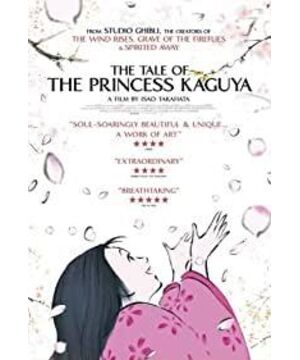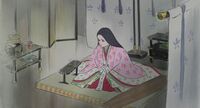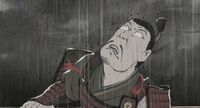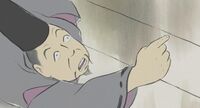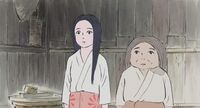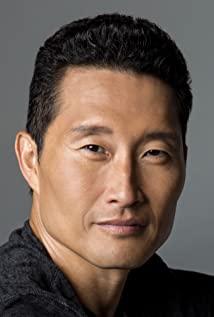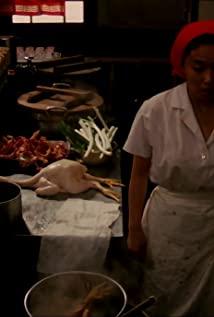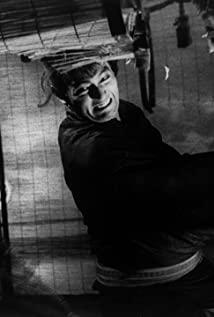The poem of "Everlasting Regret" is applied to Takahata's animation "The Story of Keiyahime", which can be changed to :
"A girl in Taketo grew up, but she was raised in the mountains and she didn't know her.
Natural beauty is hard to abandon, and once elected to the side of the king.
Looking back and smiling, there is no color in the six palaces..."
"Kuiyao Ji Monogatari": A story about "life" and "death" is
adapted from the oldest Japanese legend "Taketori Monogatari", which tells the story of the moon The fairy went down to the earth and was raised by Mr. Zhutouweng and his wife. In an instant, the thumb girl grew up into a princess who dumped all living beings. The beauty of Chen Yuluyan attracted the attention of all the young people, but she could not grasp happiness, and experienced the joys and sorrows of the world. , Finally put on a "Neon Feather Clothes", and returned to the Palace of Heaven with a trace of sorrow-that truly belonged to her destination.
The context is simple, but it is a portrayal of a person's life: the earth = this world, and forgetting all pain and mortal experiences and returning to the'Moon Realm Pure Land' symbolizes the rebirth after death. In the scene at the end of the play, the images of the baby Hui Yaoji and the moon overlap, and the finishing touch brings the insight of birth and death together, and the ending song's words: "everything now is everything in the past" also echoes this theme, Therefore, analyzing this film from this perspective should not deviate from the grand vision.
The ancients said: "Life and death are also great. The reason why "The Story of Hui Yao Ji" can bring shock is that it is basically a universal fable that discusses the big proposition of life and death. The original story mentions that the heroine Kaguya Ji came from the moon and was exiled to the world for violating the rule of the sky. Later, she became an immortal in front of a mortal and vulgar son, leaving behind the two elders who raised her with broken hearts. What crime did the princess commit and be degraded to the mortal world? Also, why do you have to return to the Moon Capital in the end? These questions have been entrenched in Takahata's mind for many years. Since he worked at Toei Animation when he was young, he first had the idea of animating the national quintessence of Japanese literature "Taketori Monogatari". At the age of 78, he worked hard and finally produced "Kui Yaohime Monogatari". "The length of this masterpiece has also been expanded from the originally expected 30 minutes to about 3 hours: "Hime no guilty of crime and punishment"-this is the main axis that runs through the whole play, and is included in the movie trailers, publicity and poster slogans. Repeatedly emphasized that this is the message that the director really wants to discuss and bring to the audience. It is not only the hand of Takahata Hoon, the master of "The Tomb of Fireflies", but also coincides with his most comprehension in his old age. The subject matter of reflection will naturally be relatively deep and serious, although it will not be an adult story, but (the bones) Inside) is by no means an ordinary Cinderella fairy tale.
But after watching the entire movie, the audience (especially in the West) is generally at a loss as to why the princess was degraded from the mortal world, and they have the impression of'the goods are wrong' and'there is no clear explanation in the play'. Some netizens in Japan even joked that it is not so much a princess, but a story of Taketori Ong's "crime and punishment". Therefore, this article will focus on analyzing the deeper meaning of the whole play, hoping to uncover the truth behind the story in "Hui Yao Ji". The key to the fuse of
Hui Yaoji's'crime' in the moon world
lies in the series of "Nursery Rhymes":
"Birds, insects and beasts, grass, trees and flowers give birth to humanity"
Why is Hui Yaoji? When did you understand this song? Why does the version she sang has an extra paragraph that other people don't know?
In the last scene, Hui Yaoji learned that she was about to return to the palace, sitting in the same room with the old woman, playing the piano and singing harmony, and recalled to her that the first time she listened to this song was when she was in the capital of the moon. The goddess who visited the earth once and then returned to the moon palace hummed; and that recollection was accompanied by two enigmatic scenes: a group of flying birds crossed Mount Fuji covered with Danxia, and a man dragged his child on the beach at dusk. Chasing the birds and rushing into the sea; when the camera turns, the father and son stand under the pine trees by the sea, looking up at the moon, feeling lost, as if cherishing someone in memory.
It is speculated from various clues that this humming goddess on the moon must be the heroine of another Japanese myth "Legend of Feather Clothes". The story roughly says:
"A group of white birds flew to the lake to bathe, and took off their feather coats to reveal the true shape of a fairy. , Was met by a man. The man put away one of the feather robe, so that a fairy could not turn back into a white bird and was forced to stay. The woman married the man and gave birth to a child. The woman asked the child to ask the man where the feather robe was hidden. After finding the feather robe, she changed Go back to the white bird and fly back to the sky, leaving behind the man and the child."
One of the locations where "Legend of Hakata" is said to take place is Miho no Matsubara (pine trees by the sea + Mt. Fuji) overlooking Mount Fuji. In the story of Kaguyao Ji. The fairy in the original film obviously wanted to return to the Heavenly Palace, but was forced to stay in the world due to the theft of the feather robe. Takahata made a slight modification to the story in response to the plot, and wrote a new chapter of "Talking about the Future" for the movie. The scene is as follows:
Although In the moon palace, the goddess has an inexplicable concern for Renhuan, and she often hums the nursery rhyme on the ground; the last part of "まつとしきかば今かへりこむ" is added by the goddess herself, so no one on earth has heard of it. . The paraphrase of the lyrics is: "If you are really waiting for me at the moment, I will go back immediately (with you). Her husband and children who stayed in the world must have died early, and after putting on the moon feather garment, she should have lost all her earthly memories, but whenever she hums this song, tears will come down unexpectedly. Cheeks. "It's incredible..." Witnessing this scene, Hui Yaoji couldn't help feeling excited: What is there in the mortal world worthy of such nostalgia, so that after putting on a moon feather garment, it can still cross time and space, across the barriers of life and death like a lot of threads. , Touch the soul of the singer? Looking at this blue planet, she couldn't help but be attracted by the lush surroundings: birds and beasts, the fragrance of birds and flowers, and the human touch, the forests are beautiful, the four seasons cycle endlessly, and they are full of green vitality.
This "Song of the Goddess" gave Hui Yaoji a glimpse of the unparalleled phenomena in the moon world, thus evoking her longing for the "life" in the world, and eager to go down to the world to experience everything that the singer's heart is attached to.
This is the crime committed by Princess Huiyao in the Moon Realm.
What's wrong with yearning for survival? Ordinary think so.
It should be noted that when the anonymized "Take Tori Tale" was written, Buddhism was introduced to Japan in prosperity, and the whole set of works was influenced by the social background at that time, and it was quite oriental philosophical. In the play, the Moon Palace is a clear and trouble-free'world of bliss'-bliss and no troubles, or more accurately, it is a realm where everything is'empty' and sorrow and happiness cannot enter. It does not arise or die, let alone the seven emotions. Six Desires: Buddhism calls it'Nirvana'.
'Nirvana' means extinction, extinction, and death. There is no sorrow, anger, sorrow, and no happiness at the same time. This is very different from the "Heaven" and "Peach Blossom Wonderland" in the minds of ordinary modern people. (Su Shi's insight into life in his later years, "Looking back on the bleak places, and when I return, there is no wind or rain nor clear" is quite Zen.)
In the eyes of heaven and human beings, the Lower Realm is a place full of filth and many evils. Suffering from'greed, hatred, and ignorance', chasing fame and fortune like a leper, trapped in the endless cycle of life and death, living a humble, life-and-death life. The buddhas and monks preach that through practice, they can get rid of the shackles of'greed, hatred, and ignorance'-the root of all the troubles in the world, and reach a state of perfection and silence (death), liberating from the suffering of endless rebirth.
In order to highlight this point, the'Moon King' who is greeted at the end of the play is portrayed as Sakyamuni (the original is only called'people who look like a king'), standing like a statue, while accompanying him. The immortals are empty expressions and dull eyes, to put it bluntly, they are like walking dead and soulless shells, which are very different from the "saints" of Western religion. It may even be bold to infer that the people on the moon are all people who have attained Nirvana and ascended to immortality during their lifetime. Since they regard the human emotions and desires as a burden, they will naturally not sympathize with the pain of parting between the heroine and her parents. (The female officials call it "distracting things", and the popular debut soundtrack'Tianren no sound', Takahata even suggested that Joe Hisaishi adopts a light semba-style suite to reflect that they come from a world of no mundane. The troubled world sounds like Cihang Purdue’s life-threatening Sanskrit in the audience's ears, which shows its originality.)
Therefore, longing for the hustle and bustle life of the dunya (the “forbidden place” in Hui Yaoji's mouth) is tantamount to turning back for those celestial beings who have realized Nirvana, wanting to lie down in the cycle of life and death, and the chaos at the mercy of the seven emotions and six desires. water.
This idea is almost a'heresy' existence.
Hui Yaoji became an alien in the moon world, but as an immortal, she was entangled in her heart and envied the life of ordinary people; in the eyes of the immortals, her mind was confused by emotions.
The'punishment' imposed by the moon world on Hui
Yaoji committed a'sin', that is, a yearning for the'life' in the world, and the'punishment' imposed on her by the moon world is again what?
As mentioned above, this film is a universal fable with life and death as its grand theme. If the princess’s “sin” is the longing for the “life” in the world, the “punishment” she has to suffer is nothing more than to correct this concept, despair of the “life” and embrace the “death” that returns to the lunar world. Yearn for. Therefore, Hui Yaoji was erased from her memory as a deity (with the exception of the nursery rhyme that triggered the incident), she fell into the mortal world as she wished, experienced the suffering and joys and sorrows of the world, and tasted the nuisance brought by many mundane children. , Under the long-term pressure and accumulating resentment, the thought of seeking death eventually arises. "Death" here does not refer to ordinary death, such as death caused by catastrophic disaster, disease or aging, but refers to "heart death"-to put an end to all the desires for survival, all thoughts are lost, and all the values, love and hate of the world are imposed. negative.
The ancients said: "Sorrow is no greater than death. Only if Hui Yaoji sees through the red dust and penetrates into the world is the truth of suffering, and sincerely wants to return to the solitary "Moon Realm Pure Land" (death), she will achieve the goal of the heavens to punish her, and it is also the end of the "punishment" itself ( 'Suspended solution').
This is the heavenly punishment that Hui Yaoji will suffer when she descends to the world.
In other words, this life in exile in the lower world is a tailor-made "ideological reform plan" for the heretical princess.
Therefore, the princess’s sin and punishment can be understood as man’s questioning of life and death, of the beauty or ugliness of the world, and even the reflection on the meaning of being born as a human being, so as to outline the two worldviews of entering the world and being born. The conflict, and in the end of the conflict, it was the Moon Realm who won.
The moment when the Emperor was hugged by the bear, Kaguyao Ji's heart screamed, saying: "I have had enough, I don't want to stay in this place anymore." This kind of world-weary thought is no different from the pursuit of death. Under arms. (When she refused to enter the palace to be a concubine, Kaguya had already told the old man that she was planning to commit suicide. She picked up the insect corpse on the loom and said to herself. At that time, her internal grievances had reached a critical point, the emperor’s A hug, the effect of closing the sound.) At the moment when she inadvertently called for help to the moon, the moon world withdrew from her excommunication, Hui Yaoji had the memory of all the heavens and people, and remembered why she came to the mortal world in the first place. , And why know how to sing songs in this strange place.
As a result, she regretted it.
"Ah, what did I do when I stayed in this land..." This is the emotion that a person made before he died, summing up his life. How many people today sacrifice their happiness in order to accommodate their parents, sell their ideals because of their inability to change the status quo, be blindly led by the social system and lose their natural instincts, and bury their true self for a long time, even if the last thing is good. What's the point of your life? It was all in vain, and I felt that it was too late when it was right now and when it was wrong yesterday. Even though you have understood the truth of happiness, you can't go back anymore; death will not slow down because you have a new experience of life. Those who want to come still want to come. (At the time when Hui Yaoji lost consciousness and was picked up by the flying clouds, it was a great compassion for her to hug her and her parents for the last time.)
To Yue Fuqin, Hui Yaoji begged bitterly. Let her stay in the mortal world and feel more about the "happiness of living in this land", which expresses this kind of sadness, helplessness and sigh for life.
Therefore, this film is actually the epitome of life-telling a whole life in one hour. What is meant by a "meaningful" life in the play, at least for the heroine, is absolutely unambiguous and muddle-headed. Even a five-year-old boy can see that she wants to be a "bamboo xun" and live the life she had in her childhood: stealing the land. Melon, catch game, play with mountains and water together, abandon Xuan Mian, make a wild flower blooming in the field, "live like a bird and beast"; to apply the stone as a prince, it is "to regard the day and night operations as joy , Regard the changes of the four seasons as food"-to be with nature, to feel the simple local humanity, even if sometimes you can only use the roots of the grass roots; leave the peace of the fairyland, and the emperor and the emperor will share the joys and sorrows in the mortal, even in the end Step towards death. (This remark is actually about the princess's heart, making Prince Shizuo the only one among the five suitors who let the father take the initiative to take the initiative. It's just that'belief is not beautiful, and good words are not.' I would use such exaggerated words to say it.)
The life in this ideal hometown is quite like the "world of virtue" described by Taoism: "Inhabiting with the animals, the clan and all things, it is evil to know the gentleman and the villain! It is the same as ignorance, and its virtue is inseparable; it is the same as lack of desire, which is simple and simple. It is simple and popular. The happiness that the princess desires is actually that simple. Although the five suitors finally came back in despair, what Hui Yaoji resisted was not marriage, but a fake and false sentiment. Hui Yaoji has been pursuing'truth' all her life, which is close to'natural'.
Helpless, it was too late when I wanted to be myself and pursue happiness with the one I loved: In just a short moment, Hui Yaoji had indeed lost all her thoughts, succumbed to world-weary despair, and asked the fairy of the moon to pick her up. ,regret but too late. This battle between'birth' and'death' was won by the celestial being, and how Hui Yaoji thought after retrieving the celestial memory was irrelevant to them. At the end of the curtain, the heavens are coming, and before putting on the forgotten moon feather robe, Hui Yaoji sings to the natural world for the last time, affirming the beauty of the world beyond everything. "It's not filthy here at all!" She retorted to the female officer who urged her to leave. For Hui Yaoji, the world is not concealed, with birds, trees, life, and the brilliance of human nature. The love of parents and the love between people can offset all the suffering in the world. Reluctantly, I put on a feather robe, and this splendid life of "truth, goodness, and beauty" in the world will also disappear with the fragrance, and it will teach people infinite regret.
The Moon has been behind the scenes to lure Hui Yaoji into thinking about life and death
Regarding online reviews, it is common to blame the sad ending on the old man, saying that he thought of himself and ignored his daughter’s feelings, robbed his daughter’s life, and then focused on the generation gap between parents and children. It is said that happiness is priceless and money cannot buy happiness. Yes, but this is just an analysis, ignoring the influence of the power that penetrates the whole play and the moon palace. At least, this is not the message that the deepest meaning of the story wants to bring out. In the framework of the'crime and punishment' that this article focuses on, one can boldly say that the old man, the five suitors, and even the emperor are nothing more than the moon palace immortals, deliberately deliberately trying to force Kaguyao Ji to'death' step by step. 'The chess piece. To put it bluntly, it is a whole set of fairy tale-like stories, from the beginning to the end, it is a game of heaven and man. It is so early to teach Hui Yaoji to instigate world-weariness, cut off all red loves, and realize that life is bitter, and returning to the root is fate. Dengxian. (This is why Hui Yaoji grew up as fast as a "bamboo xun" at the beginning, and after the cardamom years of 13 or 4 years old, the speed slowed down. The latter part of the capital is the real "interest" part of the heavens. )
Anyone can say that the move of Taketori's family to the capital is a turning point in the whole story. The "now" and the laid-out "past" are used in the play to make a powerful dualistic contrast. (Childhood in the country is the happiest time in the princess’s life, and it is also the happiest time for everyone like Taketori Ong and his wife.) But don’t forget, who burst out the stalks of gold and Ayara in the bamboo forest. The silk and satin provide the old man with motivation and a strong financial basis for the relocation and even the future talks that make the princess desperate to live. "Going to Beijing trains her daughter to be a noble princess, lives a life worthy of these clothes, and makes the noble son fall in love with her. This is the happiness of the princess."-The old man just figured out the providence and put it into practice; Whoever was born in the age of superstition would not make this association after experiencing this series of miracles. Who will be the adoptive father and mother of Hui Yao Ji's mortal world is a natural choice. It can only be said that the right person was chosen by Weng Zhutori. At the beginning, Weng Zhutori also regarded the princess as a gift from God to the old man. She held the puppet in her palms to prevent the old woman from touching; her mentality of treating the princess as her own thing remained the same in the end, but unlike the thin lover in Beijing, he truly loved her and wanted her happiness, but he figured out God’s will. The happiness that she set out to prepare for the princess is indeed a torture that God will impose on her, pushing her step by step into the abyss of despair. (At the beginning of the play, in the tug of war between wild children and old men shouting "Zhu Xun" and "Princess", the toddler chooses to walk towards the old man, which seems to indicate that when he grows up, he will become a princess according to his father's fate. ) The old man is not wrong, he is a little cute stupid.
After all, the world that Hui Yaoji dreams of is not only the beauty of nature, but also the sinister and ugly side of human nature. For Hui Yaoji to recognize that'the world is suffering', there is nothing more convincing than empathy. Wealth is what people want; if the object to be punished is a common man, he may be born in a poor family in the capital from the very beginning, using poverty to force him to submit quickly and raise the white flag to surrender; but it should be dealt with. It can be said that she is an incarnation of positive energy, "As long as I can live my own life, I will be happy when I eat the bark with you." Ling Luo added herself to her body and imprisoned the princess's heart under a Chinese dress, and placed it in a prison made of Zhu Libi tiles (just like the "bamboo cage" made by the old man for the princess, the princess is like the bird in the cage) , And as if it was Tian deliberately going against her, in addition to the inexhaustible wealth, Hui Yaoji also possesses the natural beauty and talents, and her natural beauty is hard to abandon. There are more noble children who come to propose marriage as Guo Jiangzhi Crucian carp; she was planted in the red tape imperial capital, longing for freedom in the wilderness, like a fish out of the water, painful and unwilling to live, everything was arranged by heaven, and this roundabout punishment finally worked.
The red face is a disaster, as if every gift from heaven has become a curse on her. (It can even be further inferred that if the story happened in modern times, the ending will not change.) The
irony is that none of these gifts from heaven is what she wants, and what she really wants to have is ultimately not obtained. , Can only be said to be good luck. Calculating all the accounts on the head of the old man is not getting the whole thing. (Although it is said that the emperor who really needs "ideological reform" seems to be the emperor, but this is pure joking.) In the
scene of the naming feast, the princess of the queen of curtains accidentally hears the guests fail to speak after drinking, and can't help but feel sad: I should sincerely congratulate her. The guest of, who made such frivolous offense, made the princess realize that the intention they came to celebrate her was fake. The "banquet" that the old man organized for her was fake. Everything in Shi Jinyi's life was fake; the mood of the princess suddenly collapsed like a mirage built around. With mixed grief and anger, the princess seized the door, shook off the twelve cumbersome singles, and ran on the capital avenue, heading for her childhood home in the mountains, hoping to find the'truth' of her past life.
In this scene of the princess running through the capital, the moon wheel in the sky is so big that it almost occupies the entire night sky, as if within reach; according to the interpretation of'crime and punishment', the princess' idea of'cannot stay' at this moment is the same as the moon world wants her to be born. Worrying about the world is almost the same, it is despair on the verge of death. (The part in which the princess broke the shell toy with her heart broken, the soundtrack is called "Despair".) Therefore, the moon symbolizing'death' is presented in a close-at-hand posture, and then the shape and shadow follow each other and sometimes shine brightly. Sometimes peeping at the princess running through the trees through the dead wood, the screen becomes more and more messy, and the brushstrokes are frantic and unrestrained. It is the director's expression to capture the princess's chaotic mood. This is one of the classic stills of the play, and it is also the most turbulent mood swing of the character.
Then the scene where the rockery was destroyed in the Houyuan, the full moon was sky, the princess blamed herself for causing misfortune to others, sobbing and shouting: "Fake, fake, all fake, even me!" I saw the bright moon, and watched silently. Moving in the direction of everything according to plan, it seems as if the director is reminding the audience who is the instigator behind the scenes. If this is a tragedy, then this is a tragedy without any traitors, and the ending is even more heartbreaking, as if sin and suffering are inherent in the world, sorrow is fate, and defects are part of the essence of life.
In the end, the scene of ascending to the sky by auspicious clouds and returning to the Moon Palace, who should have lost all mundane memories/emotions, looked back and looked at the blue earth. An inexplicable reluctance struck, and she burst into tears, just like the first time she sang that song when she was a child. "Nursery Rhymes" is the same when crying, everything is silent. As the theme song sings, the memory (experience) of life is deeply imprinted on the soul: memories can be erased, emotions can be erased, but the imprint on the soul will not disappear. Sometimes it’s a pity that this hatred will never end.
The'life and death' that fell into the mortal world = the'crime and punishment' of the Moon Princess. This is the ins and outs of the entire "Hui Yao Ji Monogatari".
'Life=Sin·Death=Punishment', this kind of dualistic contrast is all over the play: "Countryside·City", "Childhood·Growth", "The bondage of ethics and education, the unrestrained freedom of the field", "Ideal·Reality" ,'Beauty and ugliness','expensive and cheap','flashy and tranquil','hope and despair','principal truth, lover's false hypocrisy','male dominance, female passivity' Even the theme song's "past・present"... example can be kept.
Therefore, what Takahata Hoon wants to discuss with the "Kui Yao Ji Tale" is to touch on the most essential issues of human life. The princess’s "crime and punishment" is a question of man’s "life and death", bringing the audience out of the world and the world. Reflections on the two attitudes of being born in the world: What is a person? What is the meaning of survival? What is providence to others? Is there a life worth pursuing at the risk of death? Facing the rugged twists and turns of fate, should we accept it or resist it?
Is the world beautiful? Is it ugly? Is human nature inherently good? Evil? Is there so-called right or wrong in the world? Or is everything indistinguishable and indistinguishable?
Do people have fate? Are Gu Xian’s outlook on life and philosophy still suitable today? Have a choice, will you come to this world? Knowing that the time of death is imminent, how will you change your life?
The depth of this film is not limited to the simple communication between "love", "material happiness", and parents and children.
Hui Yaoji Xiafan has died twice. The
princess ran out of the capital from the naming feast and returned to her hometown deep in the mountains. She found that everything was already wrong. Taketo was occupied by strangers. Shemaru and her childhood playmates followed the carpenter's master. The settlement moved away, leaving only the dead tree. (From the dialogue between her and the charcoal-burning old man, it was the first time in her life that Hui Yaoji experienced winter [under one year old, 囧], thinking that the mountain was really dead and would not rejuvenate; extrapolating from the future plot From being born to being picked up by the gods, Hui Yaoji actually only stayed in the mortal world for about four years.)
The princess, who is in the shape of a wood and dead ashes, walks down the mountains alone, through the terraced fields with snow, and finally lies unsupported. On the snow; the full moon is in the sky, surrounded by a world of white and gray. "I've seen this scene..." The princess closed her eyes after she muttered, and then a moon palace fairy named Feitian came and hovered over her, seeming to guard her.
After a while, the princess woke up on the tent of her own home, and found that the banquet outside was still going on, and the waitress beside her was asleep as usual. Many viewers thought that what had just happened was a dream.
But in the scene of lying down in the snow, Hui Yaoji did die in the mortal world. The key clue is the fragments of Beihe toy on the imperial tent platform: if that section is a dream, after waking up, there will be no running in the dream and Huiyao. Ji's broken shell toy. And the white, gray world that she recalled before her death was the'Moon Realm Pure Land' where she had lived before going down to the earth and the four big ones were empty. (Later, the section describing the'Song of the Goddess' was drawn.) Thinking about it this time, it was probably to remind Hui Yaoji's death. ('Moon Boundary Pure Land' [Implications] ='Death')
I am afraid that the truth is that Princess Huiyao was the first to become exasperated before she was tortured, and she also had'sin'. Therefore, the power of the Moon Palace symbolized by'Flying Heaven' intervened and controlled Time to school back before leaving. In other words, Hui Yaoji hadn't understood the lesson that the gods punish her to go down to the world, so she was Game Over (die before the heart died), so the moon world reset the time of the world. (The celestial beings in the Moon Palace seem to have the ability to manipulate time to a certain extent. When Hui Yao Ji later fought to escape the emperor’s bear hug, she showed the ability to freeze time.) The moon seemed to be silently waiting for Hui Yao Ji to fall in love with Fan Chen. In repentance...
This is Hui Yaoji's first death in the mortal world.
After this, Kaguyao Ji has matured a lot. He listened to Sagami’s words to dye her teeth and pluck her eyebrows, and stepped towards the image of "Noble Hime-kun" in her father’s mind. She seemed to remember what the charcoal-burning old man had said before her eyes. Seeing his suffering as a winter, a test, silently waiting for the arrival of his own spring. In the play, she released animals three times: the tied cat, the grasshopper, and the sparrow in the bamboo cage, corresponding to the "beasts", "worms" and "birds" in "Nursery Rhymes". Feelings of nature/freedom.
When the five high-ranking officials and nobles came to the scene of marriage proposal, the princess would make plans to make things difficult for them, and promised to marry the treasure hunter. (In the original work, かぐや姫 came up with the five problems by himself.) Before meeting, he likened himself to a rare treasure, and Hui Yaoji saw through their hypocrisy and fell in love only from others. 'Noble 姫君', but in the end, this'姫君' image was created under the domination of the ethical education system, not the real self, the real self is passionate and unrestrained in the mountains and rivers. The lover fills up the count with fakes, trying to hide the eyes of かぐや姫, to highlight the fake love and the sinister and ugly side of human nature. Once again, Monogatari contrasts the "truth" of the beauty of nature in "Nursery Rhymes" with the "illusory" of five treasures:
Penglai Mountain jade branch='tree'
fur clothes of fire rat='wild beast'
Buddha's imperial stone bowl='flower' (the prince of Shizuo gave a purple cloud instead, saying that the peanut is next to the stone)
the five-color beads of the dragon='worm' ( Gutong's "snake" = "dragon")
Swallow's Anchanbe =
" bird " "Nursery Rhymes" sings the life that the princess really wants to live. This means that no matter how beautifully crafted artificial fakes are, they can't replace a flower or a green grass in nature, and can't bring the happiness that the princess desires. Fake Penglai jade sticks, burnt fire rat Qiu——"This is my value in their hearts." This also reminds the princess all the time that the spring future she is waiting for, the current self is also a fake, like The artificial landscape in the back garden is the same.
The five-person proposal took many layers, ranging from the dumbfounding one-leg show to the death of the princess. The princess’s reaction also changed from laughter at first, to shaking hands, to silence, to crying to the ground, to abandonment and grief. The mood is getting closer and closer to the'death' that the fairy of the moon palace wants.
Until the end, spring did not come; the princess remembered her childhood home and met Shemaru again. At that time, she had already retrieved the memory of heaven and human, knowing what was going on and being punished, she seemed to be throwing a riddle like a fatalist: "Impossible"-"It's too late"-"There is no way, I can't escape. Lost"—"I was found." In other words, "My life has been a set chess game from beginning to end. Under his control, there is no need to fight him. I am Can't escape his Five Finger Mountain. 』He can refer to'heaven and man', can refer to'destiny', can refer to'death', in short, it is the'destiny' that humans cannot break through. Shemaru seemed to understand, but still said nothing, and asked the princess to elope with him. The princess was impressed, so she gave up and became the "Zhu Xun" of her childhood, hugged with her childhood sweetheart Shemaru, and wanted to renew the front; the two traveled around the world, enjoying the colorful flowers and pastoral scenery. (This is like a terminal cancer patient who knows that his death is imminent, and simply spends his savings and retirement funds, and ran around the world.) The blue sky and white clouds, the sun is high, symbolizing'vitality' and'vitality'. The two flew up to the blue sky, overlooking the sea, but at this moment, the moon appeared in light and white days; the princess who saw the moon was panicked, begged to give her more time, and told Samaru to hug her tightly. Let go. The power of the moon dismantled the two of them, and Hui Yaoji lost consciousness and fell into the sea from a high altitude, igniting a high water column.
Shemaru woke up suddenly and found herself lying on the grass where she reunited with the princess, but she did not see the princess. Like the audience, she thought that what had just happened was a dream, and on the other side, the princess returned to the capital in an ox cart. It was not a dream. After the princess fell into the sea, she did die again in'Dead End'. The fairy used the power of the moon palace to adjust the time again.
This is the only "Problem Scene" in the whole show. Because this is not a dream, it is even harder to ignore the fact that the Samaru woodcutter has become a family. As far as the plot is concerned, this setting is completely redundant; as far as moral aesthetics is concerned, the mistake is clear at a glance; as far as the artistic effect is concerned, it destroys the atmosphere and emotion of the scene before the climax, which is almost a failure. The princess is innocent and doesn't know about the fact that Samaru has a family. The question comes from Samaru's ungrateful man: How much happiness can a man who is willing to abandon his wife and children bring her without saying a word? It seems that the happiness that the princess has always longed for is nothing but a little space at the end. At most, she can only be a princess. It is like teaching the audience to secretly call the moon to pick the princess back to the palace and prevent the plot from developing in this direction. (And the Celestial Man did act soon afterwards.) According to Supervisor Takahata, the scene of "Flying with Samaru" was originally intended to let the princess "feel the beauty of the earth and the world", and based on the original script of the script, she initially flew in the sky. What the princess and Saramaru will witness is that people "birth, old, sick, and die in different lands, which is a scene like a revolving lantern." Later, the theme of this scene was changed to "the spiritual union of the princess and Saramaru". (See "THE ART OF The Story of Hui Yao Ji" pg. 191, 228.)
In other words, the original plan of the scene of'Flying ' is actually more relevant to the topic. Taking'human beauty' as the starting point, we can see the birth, old, sick and death on the earth, echoing the whole set of The grand theme of'life and death', and the appearance of the moon also has a reasonable explanation, because the scene symbolizes the scene that people see before their deaths, which is like a'horse lantern'. After changing the theme, the focus is changed. Falling on the love of men and women makes the audience worry about the fact that the man has a family.
Perhaps, this is what the director wants to express that things in the world are really inaccurate (the princess just said in the dialogue, "If I am with you, maybe I will be very happy"), reflecting the impermanence of the world, the time before is really not going back. Come so far. In short, it seems that Kaguyao Ji was deceived by a man in the end—perhaps, this can even point out the hardship of the protagonist in the play.
The ancients said: "Simple but the world can't compete with it for beauty. The beauty of Hui Yaoji comes from her dedication to'true'. "True, sincere is the most sincere, not sincere, not moving. 』
Whether it is to send the five suitors witty, or to be awkward with the shackles of traditional rituals, the princess holds this'truth'. For Takahata, this kind of courage to get rid of the shackles of the patriarchal society breaks through the long-term. The female consciousness displayed by depression is the true beauty of women.
Hui Yaoji has been pursuing'truth' all her life, which is close to'natural'-that is,'not deliberately'. 'Being beautiful without deliberately' is the highest state of beauty.
In the scene of cherry blossom viewing, かぐや姫, with a heart of innocence, ran up the hillside in a hurry, watching the falling cherry blossoms, blowing the snow and sighing, filled with the joy of life. From being a baby lying in the arms of his mother, laughing when he hears the song of the birds, and reveling in the beauty of the world when he grows up, this is the enthusiasm for life that many urbanites have long lost. Seeing her jumping and dancing under the cherry tree alone, like a broken-winged angel falling into the world, pushing the poignant beauty of Japanese literature in the middle of the sorrow to the peak; whether it’s the dancing posture or the innocent smile, it’s all A song of praise to life is so beautiful that it is heartbreaking. The cherry blossoms are falling like snow. Who knows what lies behind is the fleeting beauty of the world and the tragic fate of Yiren's fragrant and jade?
Later, with Samaru soaring into the world, the princess opened her arms and asked the world to accept her, expressing the feeling of "Heaven and earth live side by side with me, and everything is one with me"!
When such an innocent and innocent sunshine girl descended into this nasty world, and finally was helpless by the red dust and succumbed to world-weary despair, what was the warning to the world?
General Comment: High-level, deep meaning, and full of flavor.
This 8-year, 5.1-billion-yen masterpiece is a masterpiece of Takahata's culmination in his later years.
To be able to adapt an ancient mediocre myth to this point, to portray the protagonist's princess so flesh and blood, to inject such a rich soul into the character, and to sublimate a person's life to the level of a universal fable is beyond all expectations. Yes, it can be said that the blue is blue, and it is quite a bit of a stone. (Although the original "Bamboo Tale" is not as bad as the'stone', the princess in the story always gives the impression of being unattainable and indifferent to human fireworks, which does not resonate in the readers' hearts.)
The movie is like a mirror, reflecting the various social conditions, and the hypocrisy of ethical civilization in the original work, as well as the ugly criticism of human nature's "greed, hatred, and ignorance". It travels through time and space, and it is still loud and sound. After watching it, it echoes in the human heart. There is no lack of aftermath that can't go around the beams.
Returning to the basics of the ink painting style, it is as if watching a scroll with a moving axis, and there are poems in the painting, which is refreshing. With just a few strokes, the beauty of oriental women is on paper. How can it be achieved by the flood of CGI animation nowadays?
Although the box office performance in Japan is not as good as ideal, it is only enough to recover half of the cost (only 1/5 of Hayao Miyazaki's film "The Wind Rises" at the same time, embarrassing), but it means more than those commercialized, flashy Hollywood movies How many times better it is, it can be called the highest masterpiece in the history of animation; such an artistic treasure, it is not an exaggeration to say that it should be included in the spiritual and cultural heritage of mankind.
From the movies of Hayao Miyazaki, to the animations produced by Western animation companies (including Disney), none of them has ever shocked me so much. There is a feeling that this set has become exquisite and has a view of the small mountains. The box office is not stagnant, it can only be said to be high and few. (I dare say that even the Japanese themselves don't know what they missed.)
I think that if a set of films can bring the audience's reflection on life in this way, it will fulfill the social responsibility of literary and cultural education. (Although there is a regret of "Problem Scene" at the end, it does not damage the depth of the whole work.)
Therefore, I give this movie the highest evaluation:
A++[★★★★★★★★★★ + 2.5★] an
exceptional 12.5 /10 stars, "A++" grade made by classic gods
View more about The Tale of The Princess Kaguya reviews


